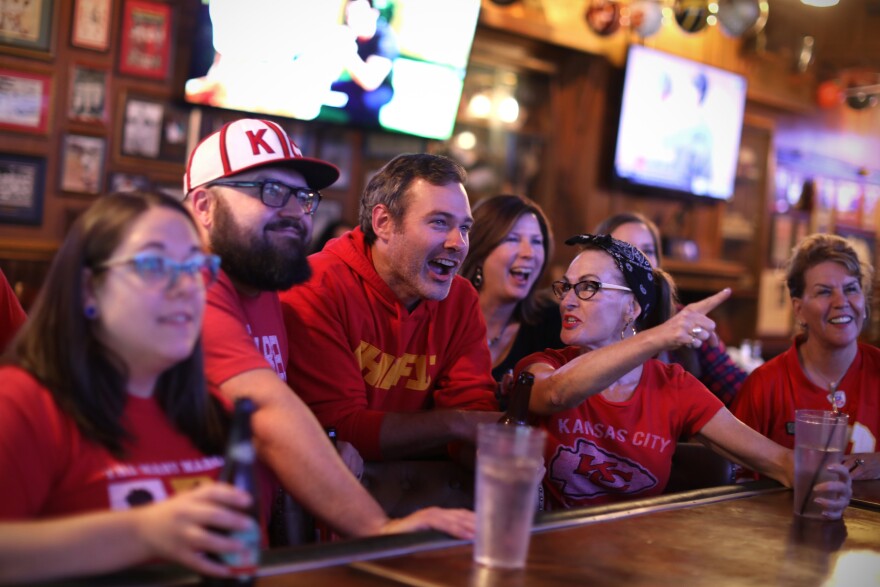There were more than 1,500 disappointed people at Arrowhead Stadium on Jan. 29, not including visitors from Ohio.
On the day the Kansas City Chiefs defeated the Cincinnati Bengals to earn their third trip to the Super Bowl in the past four years, 1,550 people tried and failed 4,571 times to place a bet on the game.
Across Missouri, more than 136,000 transactions were blocked on game day.
That is just a small fraction of the 8.7 million attempts from 221,000 Missouri accounts to access legal sports books operating in other states during the NFL season, according to data from GeoComply, which provides geofencing services for legal Kansas sports books.
Within Kansas, legal bets were placed from almost 532,000 unique accounts since wagering began on Sept. 1. The number of accounts is equal to one-fourth of that state’s over-21 population.
On the day of the AFC Championship game, bets from 236 Missouri accounts were accepted from people who crossed over into Kansas.
“We observe hundreds of transactions like this every day,” the company stated in an analysis of the NFL season through the end of the conference championships.

On Wednesday night, a hearing in the House Emerging Issues Committee marked the renewal of the years-long effort to legalize sports betting in the state. In past years, the bill has failed because of opposition from lawmakers who see video lottery terminals as a better source of state revenue.
The committee did not vote on the bills and Chairman Bill Hardwick, R-Waynesville, said after the hearing that he was uncertain when a vote would occur.
The two bills heard Wednesday, identical legislation sponsored by Reps. Dan Houx, R-Warrensburg, and Phil Christofanelli, R-St. Peters, have the backing of every major league sports franchise and most of the casino companies currently operating in the state. They are essentially identical to bills debated last year.
They would allow anyone over 21 to download a sports wagering application to their phone or computer and place bets from anywhere within the state.
Other provisions include:
- A 10% tax rate on net revenue to sports books. The tax rate on casino game revenue like slot machines and blackjack is 21%.
- A deduction from net revenue for promotional costs such as free bets intended to draw gamblers.
- Exclusive rights to major sports teams to control advertising of sports books within a designated territory around their stadiums.
- An allowance for each of the state’s casino companies to offer up to three betting platforms, or skins, and each major sports team to contract with one additional platform.

According to the fiscal analysis of the bills, sports betting is expected to bring $6.6 to $22.4 million in tax revenue in the first fiscal year it is legal, growing to a range of $21.6 to $29.3 million when the market matures in about four years.
During the hearing, members of the committee showed there is bipartisan support and intense public interest in legal sports betting.
“My constituents want this,” Rep. Ashley Aune, D-Kanas City said, describing interactions as she campaigned for re-election. “What I heard from, honestly more people than I expected, is ‘why can’t we do this in Missouri.’”
The bills would stop Missourians from traveling to Kansas, Illinois, Iowa, Arkansas or Tennessee, adjoining states where sports betting is legal, Christofanelli said.
They would also replace illegal sports wagering sites operating outside the U.S., he said.
“The revenue is going overseas to countries that may not have our best interests in mind,” he said.
Opposition to the bill took two tracks – representatives of professional players who want protections from fans upset over losing bets and a lone voice asking lawmakers to take a bigger share of the casino revenue in taxes.
Steve Fehr, general counsel of the NHL Players Association, said the protections from disgruntled wagerers include the families of players. There should also be a prohibition on wagers based on biometric data from a player, such as their heartbeat when catching a touchdown pass.
Bob Priddy, the retired news director for Missourinet, said the bill is written to give all the advantages to the casinos. If the tax was equal to the rate paid by casinos on other games, he said, the state would receive an extra $107 million.
“I don’t mind if the casinos tilt the tables inside the casino,” Priddy said. “But when they tilt the tables against the state of Missouri, the legislature needs to step in and make it right.”
This story was originally published by the Missouri Independent, part of States Newsroom, a network of news outlets supported by grants and a coalition of donors as a 501c(3) public charity. Missouri Independent maintains editorial independence.


